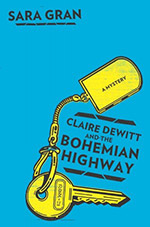When Annie Hall first came out, I saw it with my mother. I was a senior in high school, and I was absolutely transported. It’s still one of my favorite movies. My mother, on the other hand, was disturbed by it. She was dismayed by the easy way Annie moved in with Woody Allen’s character, without being married, and the casual nature of the sexual relationships throughout the movie. It seemed like a sea-change to her.
Sara Gran’s novel, while I liked and appreciated it, feels like a sea-change to me, a generation later. I guess I’m the now the older person reading about a younger one; about a younger person whose choices I don’t always understand and whose “lifestyle” is foreign to me. That’s a good reason to read books, of course, and while Claire has a drug issue – it’s presented as almost normal for her to be snorting cocaine off her house keys – it turns out that her drug use, like everything else in this novel, is a journey of self-discovery for her.
I was mostly captivated by this novel. Gran’s voice is an original, witty, and at times, deeply profound one. And as an enthusiastic customer pointed out recently, “her prose sings.” It does. She calls on tropes from mystery’s long and varied history, referring obliquely to both Raymond Chandler and Nancy Drew, while at the same time telling an up to the minute story of a murdered musician whose devastated wife comes home and finds him, a robbery gone awry. Claire doesn’t think it was a robbery.
Curiously, Claire also resembles Jacqueline Winspear’s Maise Dobbs in that she brings a kind of spiritual, empathic sensitivity to solving a case. She apparently studied with a great (sadly fictional, though a brilliant creation on the part of Gran) detective named Jacques Silette, whose followers are devoted utterly to the truth at all cost.
Claire had a prior relationship with the dead man and is devastated by it as well as wanting to find out who killed him. Interspersed with her search for Paul’s killer is a recollection of her first case with a high school friend – they searched for a missing friend of theirs. That story is resolved before the denouement of the main story, but it helps to tell Claire’s backstory. While much of Gran’s writing is layered with irony and self-conscious wit, she also brings her character of Claire very vividly to life.
It’s also told in a very episodic way. Looking at Gran’s biography, she writes for television (notably Southland, a real favorite of mine, in part because of Regina King’s kick-ass character on the show) so it may make sense that she writes in episodes. Everything is in brief, digestible pieces. Gran is for sure a talented writer; she actually does bring emotion into her resolution, which isn’t unexpected, but it’s heartbreaking. But while telling the story this way keeps Claire a bit of a mystery, it also left this reader, at least, wanting just a bit more. I personally prefer a more sustained narrative – but maybe that’s a generational thing. Either way, episodic or sustained, this is a welcome new voice to mystery fiction.